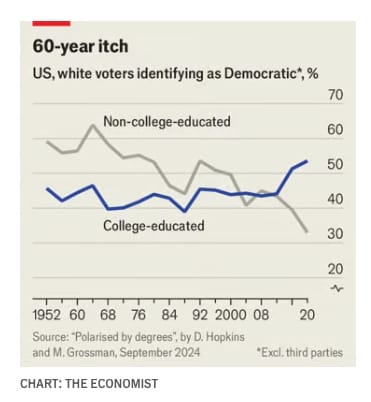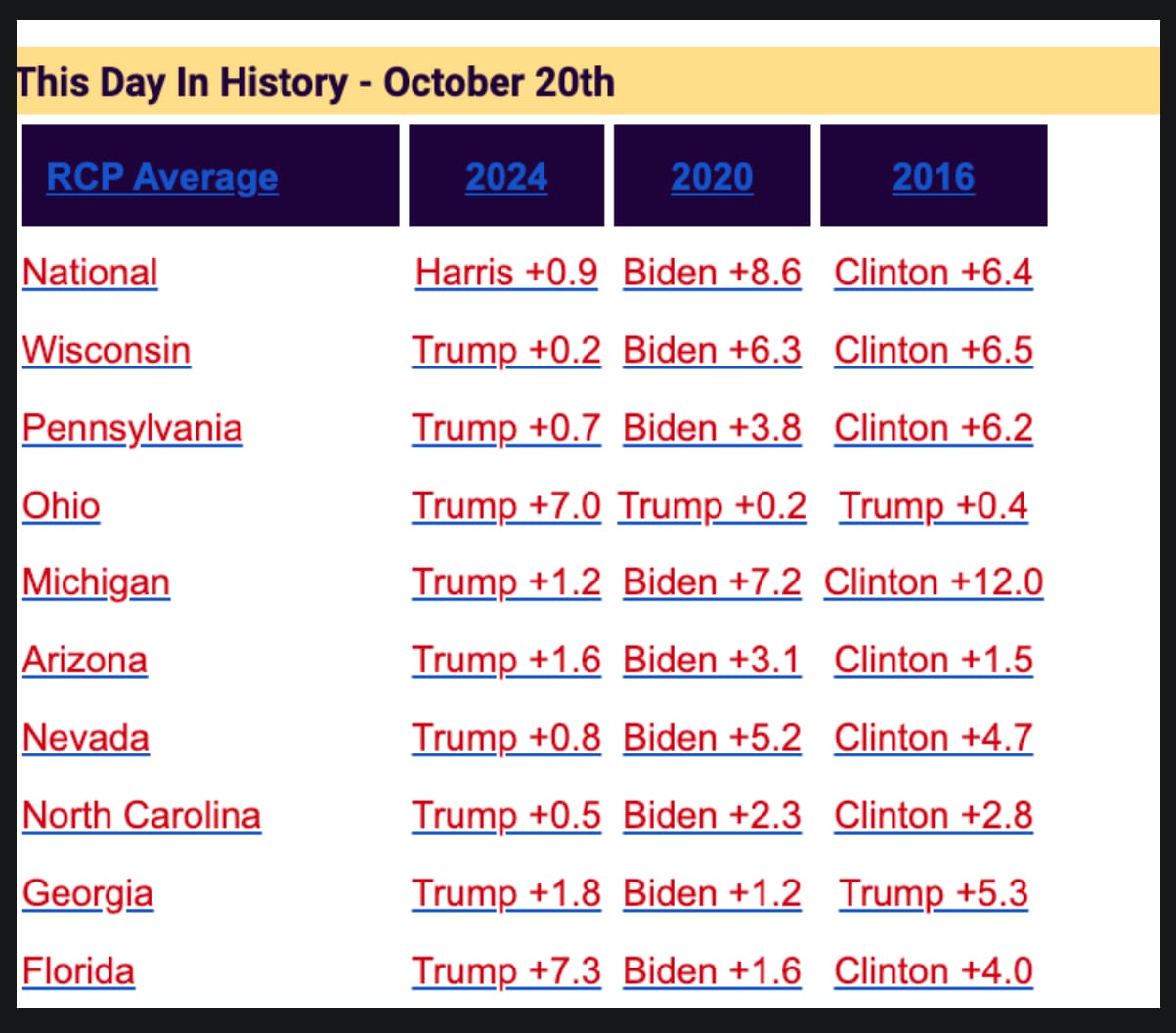October 22 2024
Education polarization reshapes politics; Polls 2 weeks out; Murdoch sues AI start-up; Will AI boost power demand?; BRICS expands global influence; JFK announces Cuban blockade

1. Polarization by Education is Remaking American Politics
2. What the Polls Say Two Weeks Before the Election
3. Rupert Murdoch’s Dow Jones Files Lawsuit Against AI Start-Up Perplexity
4. Are AI and Data Centers Power Demand Forecasts Overcharged?
5. BRICS Seeks to Build New, Non-Western, World Order
October 22, 1962: JFK’s address on Cuban Missile Crisis shocks the nation
See the new Ad Astra Podcast! Released on Apple and Spotify around 10a CST.
Editors note: We’re still waiting on Israel’s retaliatory strike on Iran. It will come and when it does, we’ll cover it.
1. Polarization by Education is Remaking American Politics
Voters are increasingly divided by their educational degrees; the traditional working-class base of the Democratic Party has eroded and been replaced by the college-educated. This trend is not uniquely American—it is visible among parties of the left across Europe. But its impact on America is strong. Educational polarisation has remade the map of battleground states and districts and triggered ideological changes in both parties. It has transformed not just where candidates campaign, but what they say. It used to be that high educational attainment was a reliable predictor of Republican voting. George Babbitt, the eponymous main character of Sinclair Lewis’s 1922 satire of bourgeois conformity, is a college-educated real-estate broker for whom “the senators who controlled the Republican Party decided in little smoky rooms in Washington what he should think about disarmament, tariff, and Germany”. In later decades, data show the same. From 1952 to 2000, a majority of white voters with college degrees self-identified as Republicans. From 2012, this affiliation began to weaken. It loosened even more once Mr Trump became the Republican nominee in 2016. By 2020, the white college-educated called themselves Democrats by a 2:1 margin. And there were many more graduates. Their share of the electorate rose from 8% in 1952 to 40% in 2020. Democrats lost support among whites without college degrees, who now favour Republicans by their own margin of 2:1. Polarisation along educational lines also means polarisation by geography because Americans increasingly sort themselves based on their educational credentials, with cities at the centre of the knowledge economy.

The fight over Mr Lamb’s old district is a microcosm of the test Democrats face. It requires an answer for anger about deindustrialisation. “We suffered through terrible trade deals that really hurt places like western Pennsylvania, pushed by Wall Street and a corporate management ideology that just chased the cheapest and weakest labour and environmental rules,” says Chris Deluzio, the one-term Democratic incumbent. His Republican challenger, Rob Mercuri, a state representative, agrees that outsourcing of manufacturing jobs, especially steel, was “directly tied to policy choices that elected leaders have made over the years” In 2020, Democrats promoted ideas exciting to the college-educated, such as defeating systemic racism. Ms Harris was no exception. The national Democratic Party has realised that promoting anti-racism is a losing strategy. This time, Ms Harris is pitching herself as a pro-fracking, gun-owning, common-sense Democrat who likes unions and is wary of corporations. Her economic agenda is concerned with protecting American jobs through industrial policy and funnelling more tax credits to workers. Mr Trump, too, has moved the Republican Party to the left on economic issues, courting unions and promising tax cuts on tips, social security benefits, even car-loan payments. Whether it is working is hard to tell. The voters both candidates are jostling over are not just unfriendly to the country’s college-educated elites: they are reluctant to answer pollsters too.
Article Source: Economist
2. What the Polls Say Two Weeks Before the Election

Article Source: RealClearPolitics
3. Rupert Murdoch’s Dow Jones Files Lawsuit Against AI Start-Up Perplexity
Rupert Murdoch’s Dow Jones and the New York Post have accused artificial intelligence start-up Perplexity of a “brazen scheme” to rip off their journalism for its AI-driven search engine in a lawsuit filed in New York on Monday. The publishers, both subsidiaries of News Corp, alleged the AI start-up, which is seeking to raise up to $1bn in a funding round that will value it at $8bn, was “engaging in a massive amount of illegal copying” of their work. The lawsuit said Perplexity is “diverting customers and critical revenues” away from the news publishers, whose titles include the Wall Street Journal, “freeriding on the valuable content the publishers produce”. Perplexity’s search engine allows users to get instant answers to questions, with sources and citations, using large language models (LLMs) from platforms such as OpenAI and Anthropic.
Editors note: add this to the lawsuit by The New York Times against ChatGPT maker OpenAI. The court cases defining AI intellectual property rules currently working their way through the American legal system are hugely important.
Article Source: FT
4. Are AI and Data Centers Power Demand Forecasts Overcharged?
Data center operation is one of the fastest growing industries worldwide. The International Energy Agency recently projected that global data center electricity demand will more than double by 2026. In the United States, the national outlook could resemble the global outlook, but is highly uncertain. One key uncertainty that could change the trajectory of data center load growth is the use of generative AI models. Both public and corporate imaginations were triggered by the release of OpenAI’s ChatGPT on November 30, 2022. Evidence about how widely these tools will be used and how much they will change computational needs is just starting to emerge. These early applications were estimated to require about ten times the electricity—from 0.3 watt-hours for a traditional Google search to 2.9 watt-hours for a Chat- GPT query—to respond to user queries. Creation of original music, photos, and videos based upon user prompts and other emerging AI applications could require much more power. With 5.3 billion global internet users, widespread adoption of these tools could potentially lead to a step change in power requirements. On the other hand, history has shown that demand for increased processing has largely been offset by data center efficiency gains.
Article Source: EPRI
5. BRICS Seek to Build New, Non-Western, World Order
After Russia launched its full-scale invasion of Ukraine in 2022, the West imposed sweeping economic sanctions, cut its access to the global banking system, and sought to isolate Russia diplomatically from the rest of the world. But President Vladimir V. Putin of Russia is determined to show the West that he has important allies on his side. This week Russia is hosting the so-called BRICS group — which stands for Brazil, Russia, India, China and South Africa — in a gathering of emerging market countries. The meeting, which begins Tuesday, has expanded this year to include Egypt, Ethiopia, Iran and the United Arab Emirates. Its wonky name notwithstanding (it was coined by a Wall Street banker in 2001), BRICS now includes countries representing almost half the world’s population and more than 35 percent of global economic output, adjusted by purchasing power. The conference is intended to present a hefty showcase of economic might but also entice new countries into a coalition Russia hopes to build that would form a new world order not dominated by the West.
Article Source: NYT
October 22, 1962: JFK’s address on Cuban Missile Crisis shocks the nation
In a televised speech of extraordinary gravity, President John F. Kennedy announces on October 22, 1962 that U.S. spy planes have discovered Soviet missile bases in Cuba. These missile sites—under construction but nearing completion—housed medium-range missiles capable of striking a number of major cities in the United States, including Washington, D.C. Kennedy announced that he was ordering a naval “quarantine” of Cuba to prevent Soviet ships from transporting any more offensive weapons to the island and explained that the United States would not tolerate the existence of the missile sites currently in place. The president made it clear that America would not stop short of military action to end what he called a “clandestine, reckless and provocative threat to world peace.”
Sources
1. https://www.economist.com/united-states/2024/10/13/polarisation-by-education-is-remaking-american-politics
2. www.realclearpolitics.com
3. https://on.ft.com/3Ujo8j0
4. https://www.epri.com/research/products/000000003002028905
5. https://www.nytimes.com/2024/10/21/world/europe/russia-china-brics.html?smid=nytcore-ios-share&referringSource=articleShare
